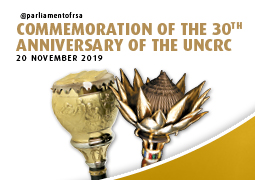
Children’s ambassadors across the country converged at Parliament today to commemorate the 30th anniversary of the United Nations Convention on the Rights of the Child. In this feedback session there was a unanimous agreement that although much has been achieved in this regard, a lot more still needs to be done.
The fact that “we are still talking about the agitation of children’s rights and many challenges they are still faced with today, shows that much more still needs to be done,” said the Deputy Chairperson of the National Council of Provinces (NCOP), Ms Sylvia Lucas.
But she took solace from the fact that “the Children’s Convention was one of the international charters to be ratified by South Africa in 1995”. To her, this “showed how serious South Africa took the promotion of the culture of children’s rights”. But also, in her view, this commemoration signalled that “nothing for children without children”.
Her Co-Chairperson, Ms Domonique Mertenton, the Speaker of the 2018 Nelson Mandela Children’s Parliament, advocated for the modernisation and harmonisation of legislation to advance the rights of children. She also echoed the fact that “as ambassadors we are representing 19.5 million children. We don’t only have numbers on our side, but we are also representing the future of this country.”
An ambassador from North West, Mr Yusuf Bhyat, said they appreciate the achievements attained by the government since the ratification of the convention, but those in executive authority should also be reminded of the shortcomings of our education system, which “seem to prioritise quantity rather than the quality of passes in Grade 12”. In the same breath, he bemoaned the lack of quality teaching in some of our schools, especially in most disadvantaged schools.
The plight of deaf pupils was the most touching. Mr Simon Silanda, a pupil from Nuluthando School for the Deaf in Khayelitsha, narrated the painful experiences they are still confronted with. “When we finish school, we cannot go to universities because we don’t have our own personal interpreters to take care of us. We end up staying at home doing nothing, instead of pursuing our educational dreams.”
He urged South Africans that “everyone must take the initiative of learning a Sign Language. It is unfair to be discriminated against because we are differently abled. We want to enjoy the rights enshrined in our democratic Constitution like everyone.”
An ambassador from Gauteng, Ms Nichole le Roux, presented a series of recommendations that the children of South Africa want the government to consider from the spike in gender-based violence, corporal punishment, flaws in our justice system when it comes to the promotion of the Children’s Protection Act, right to quality education and protection against unjust cultural practices that victimise children.
In response to some of the issues raised by the ambassadors, The Chairperson of the Select Committee on Social Development and Health, Ms Maurencia Gillion, commended the level of enthusiasm displayed by the ambassadors in championing children’s rights. She assured them that “some of the issues you raised are high on our committee’s agenda. We will give the necessary attention to issues raised to ensure that are responded to by the relevant departments.”
Mr Elphus Mathebula, representing the Chairperson of the Portfolio Committee on Public Works and Infrastructure, said their committee “prioritises education and we will ensure that the best schools are built and mud schools are done with to ensure that we cultivate an effective culture of learning and teaching in our schools”.
He promised that the committee “will walk with them in every step of the way in ensuring that all South African children get quality education”.
According to the Unicef representative, Mr Sanjay Wijesekera, it was a fitting tribute to have such a commemoration at Parliament. “In many ways South Africa should be proud of its commitment to the welfare of its children.”
Most of all, he was proud that the ambassadors have, during their deliberations, put a clear policy agenda that represents their cause. “As Unicef, we encourage children to raise not only their problems, but to suggest solutions to them. We have clearly seen that today. It’s up to us, the adults, to hold ourselves accountable and to let children speak out for their rights.”
The representative of the Human Rights Commission, Ms Matlodi Makwetla, advocated for the reinstatement of the Office on the Rights of Children in the Presidency. “While it was there before, it was well-resourced. It had a strategic vision and direction. But ever since it was moved from the Presidency to various departments, “the cause for children’s rights lost its strategic direction. As a result, it is now not well monitored and its policies are not implemented, monitored and evaluated efficiently as it was the case before.”
The Minister of Social Development, Ms Lindiwe Zulu, urged the ambassadors to learn from those who came before them. “We were where you are many, many years ago. We have also gone through what you are going through, even the worst of situations during apartheid. Take a leaf from the fact that in 1995 when our country ratified the Children’s Convention, we had men and women who wanted a different South Africa for its youth. You are the beneficiaries of that. Going forward, let’s join hands in building a South Africa that you want; that you articulated so eloquently today,” she opined.
“Let’s concede that our young democracy has achieved so much,” said Ms Lucas, “but let’s also be honest about the failures of our policies, of our accountability measures. The fact that we are still faced with so much children’s rights challenges 30 years on, illustrates the inadequacies that we need to respond to. Let’s invigorate the spirit of activism to secure our children’s future.”
By Abel Mputing
20 November 2019

